本文主要是介绍NUC980开发板CAN开发笔记,希望对大家解决编程问题提供一定的参考价值,需要的开发者们随着小编来一起学习吧!
一、内核开启CAN
CAN 设置
NUC980 系列带有2个CAN(Controller Area Network), 可以分别独立设置。 请按以下的说明来使能CAN功能. 每个CAN可以单独的开关. CAN0有多组管脚可以选择, 需要一并设置。
使用者也可以设置CAN的唤醒功能。步骤如下:
进入 NUC980-linux-4.4.y-master
打开终端,输入
make menuconfig
选择 Networking support
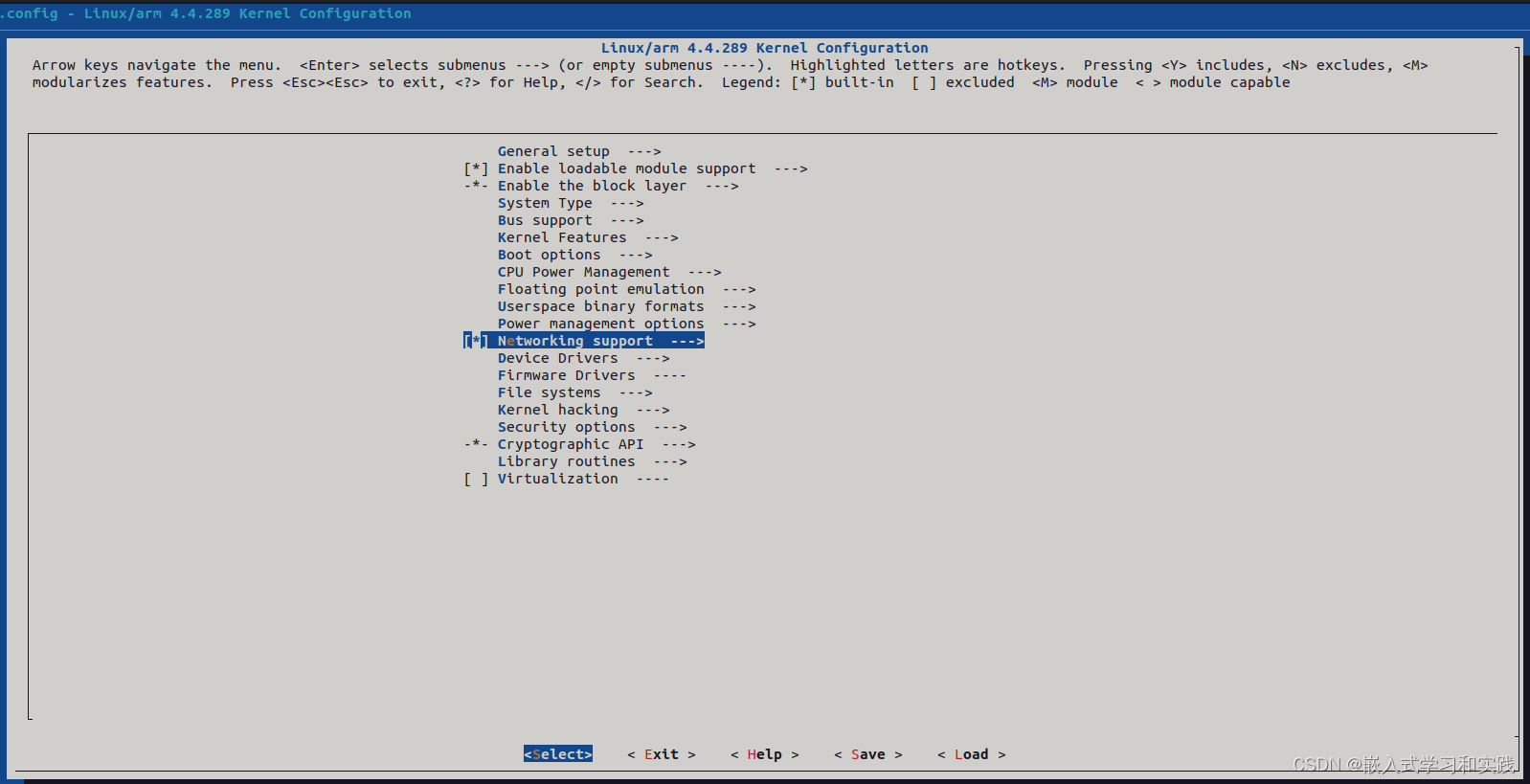
选择 CAN bus subsystem support
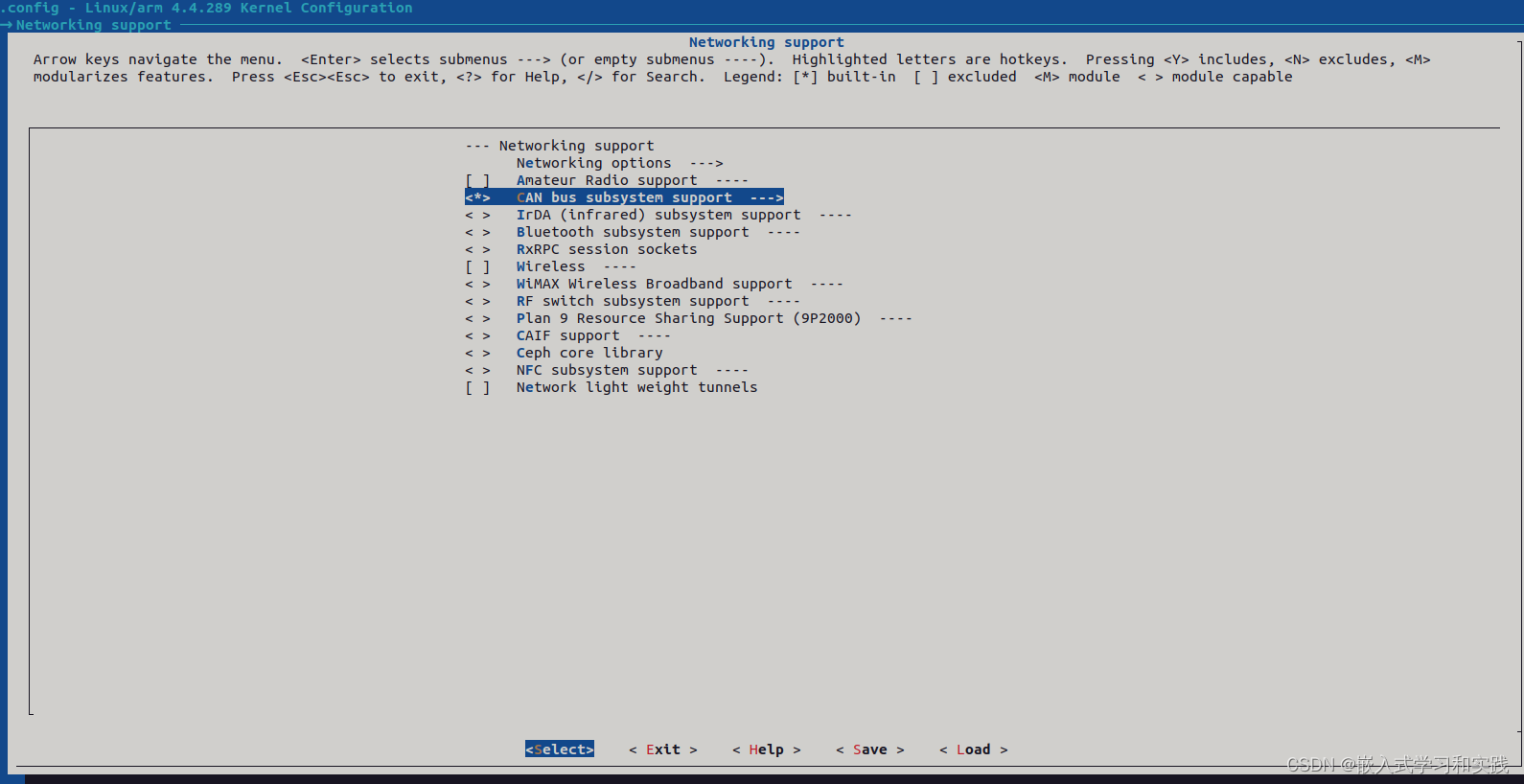
选择 CAN Device Drivers

选择 NUC980 CAN0~CAN3 devices
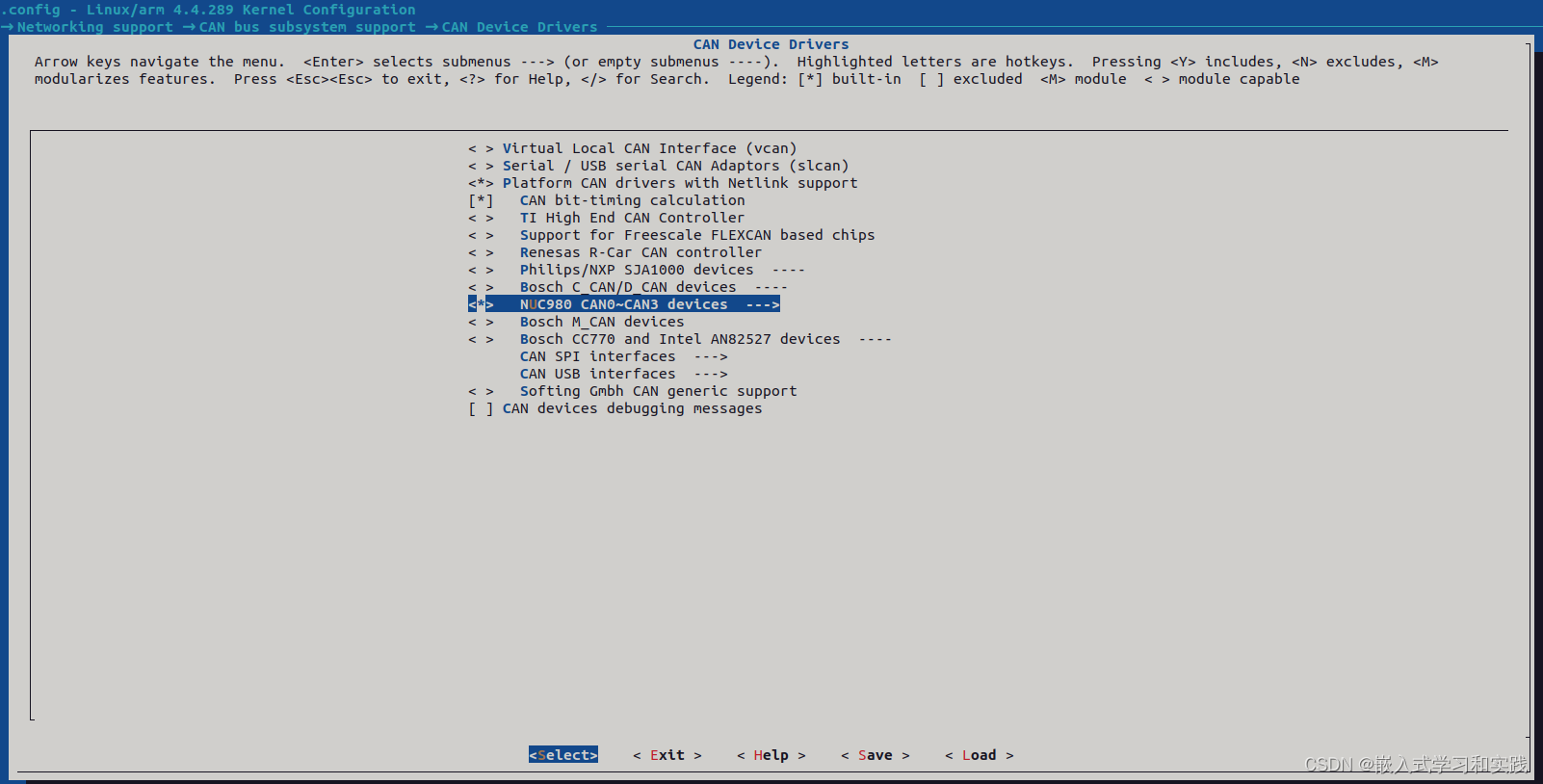
根据电路选择对应的引脚
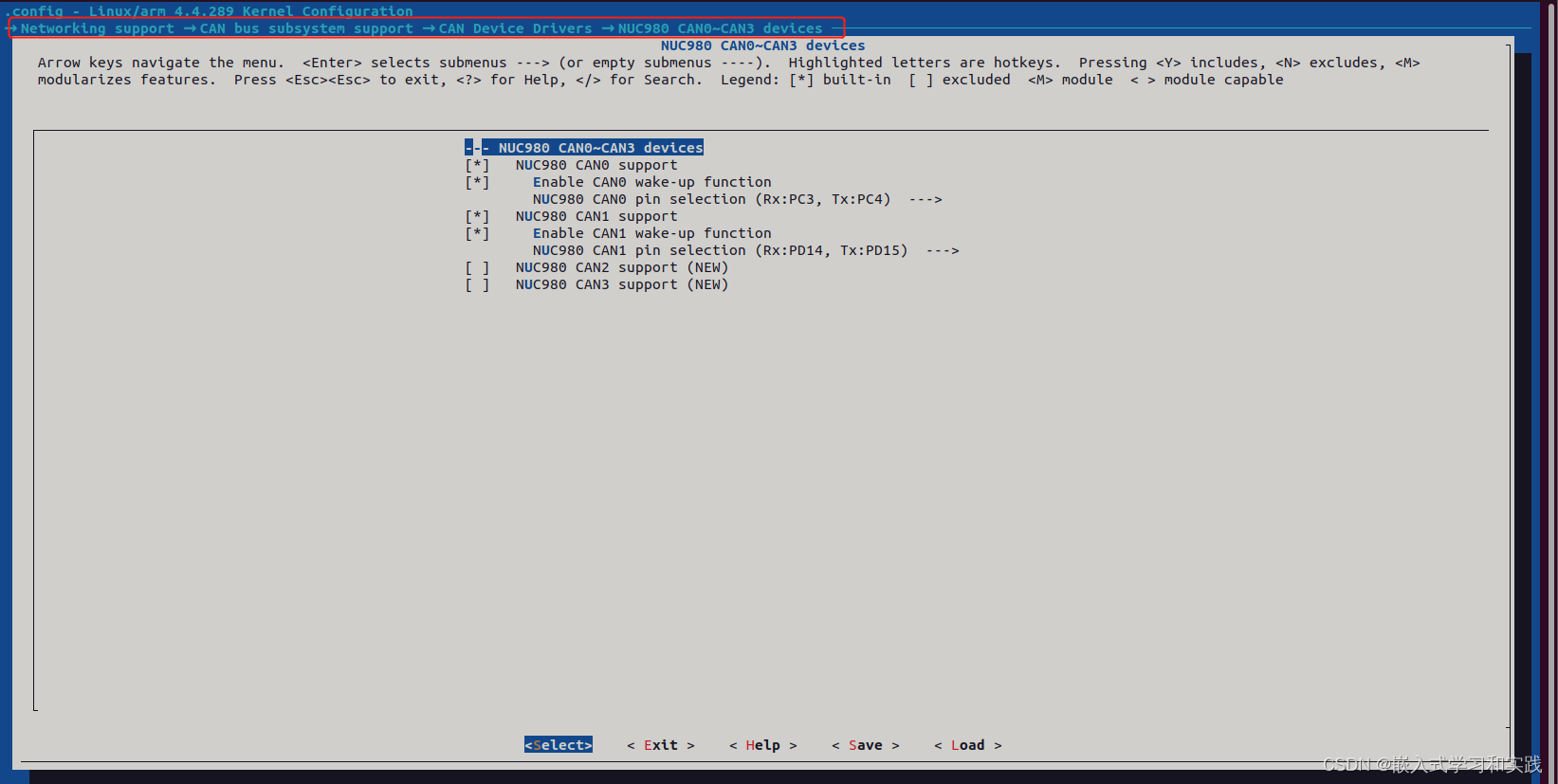
保存,退出。
重新编译镜像,下载到开发板即可。
注意:
内核配置中,查看使用的CAN引脚是否和其它功能比如串口有冲突,有的话需要取消未使用的功能配置。
电路设计,使用 CAN芯片 SN65HVD230 (SN65HVD23x 3.3V CAN 总线收发器)。
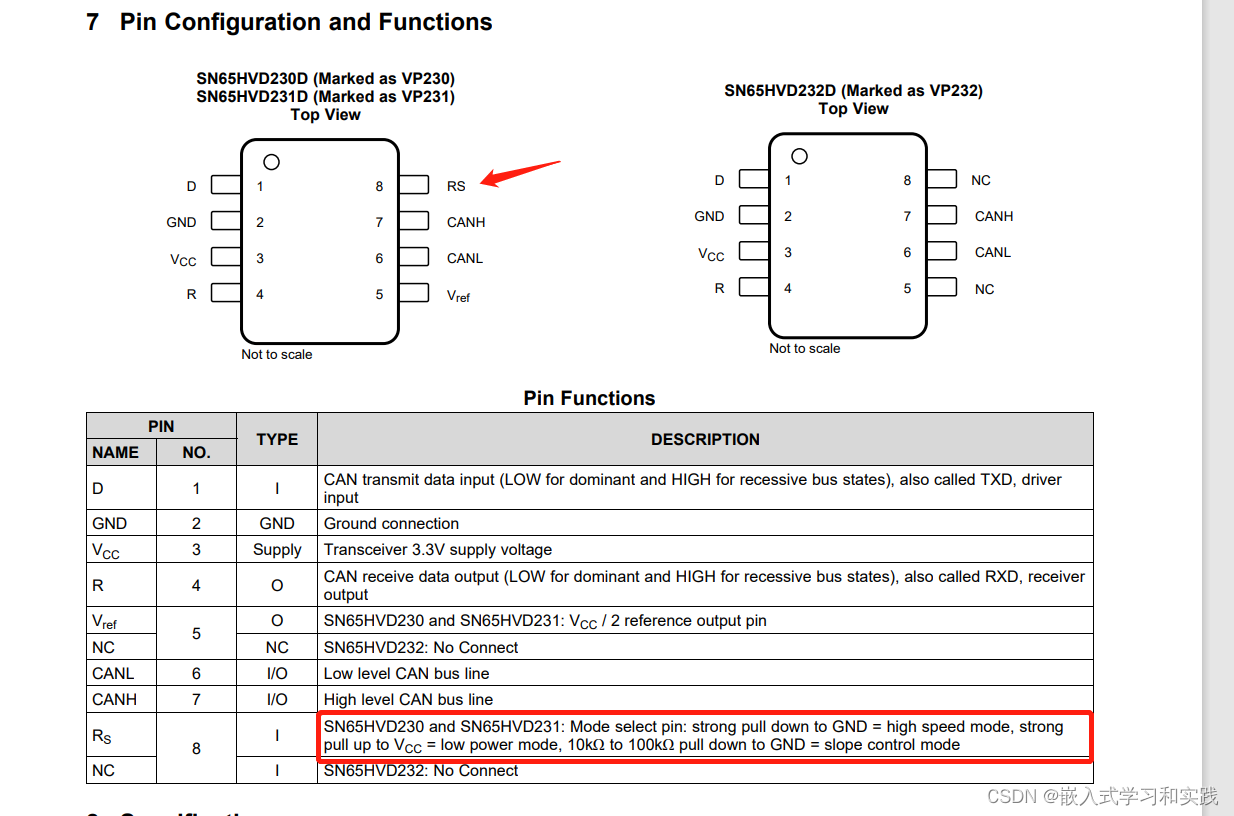
需要注意RS引脚,该引脚是模式配置。
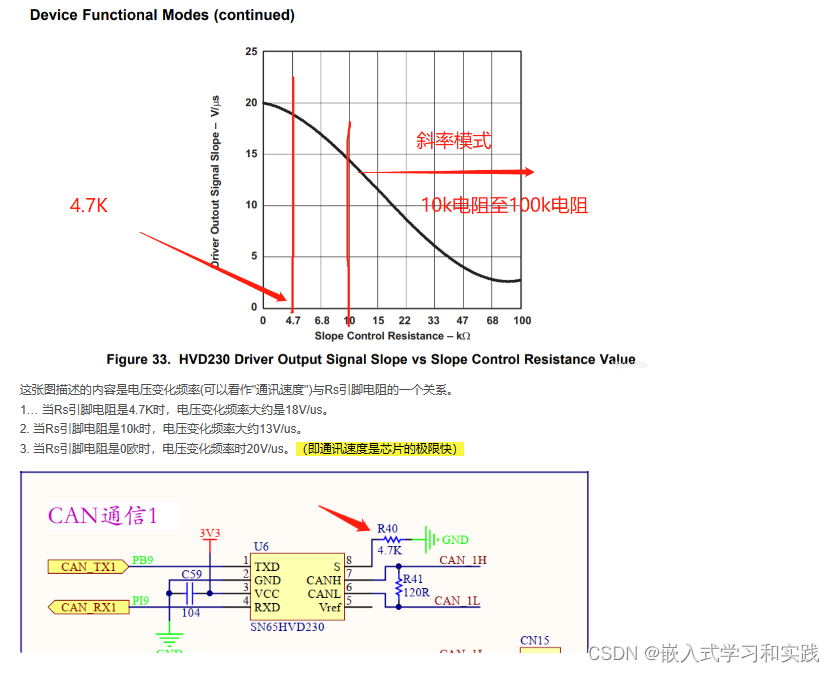
二、测试代码
指令查看
ifconfig -a
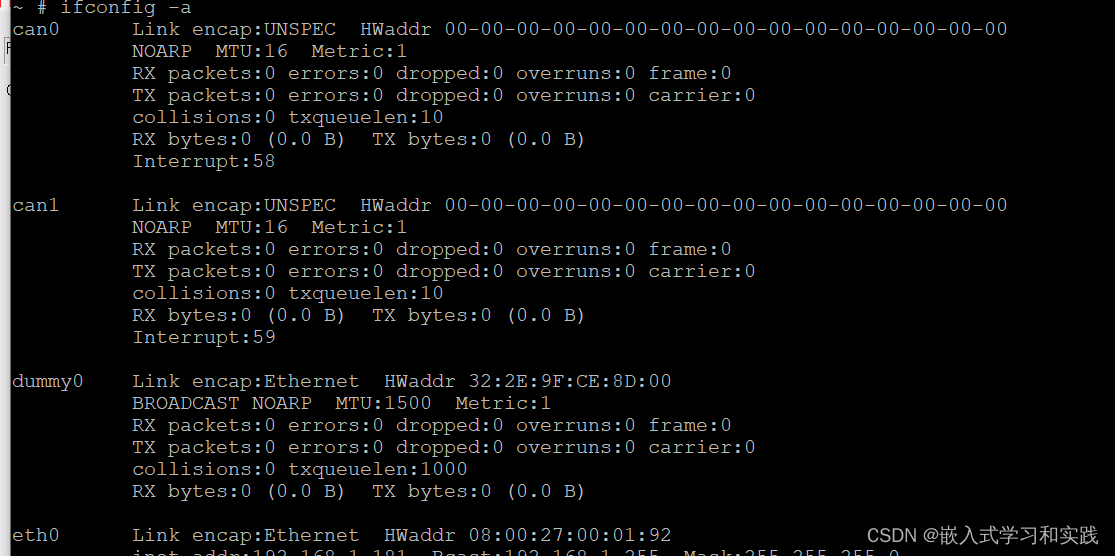
或者
ls /sys/class/net

官方测试代码
/** Copyright (c) 2014 Nuvoton technology corporation* All rights reserved.** This program is free software; you can redistribute it and/or modify* it under the terms of the GNU General Public License as published by* the Free Software Foundation; either version 2 of the License, or* (at your option) any later version.**//* libsocketcan.c** (C) 2009 Luotao Fu <l.fu@pengutronix.de>** This library is free software; you can redistribute it and/or modify it under* the terms of the GNU Lesser General Public License as published by the Free* Software Foundation; either version 2.1 of the License, or (at your option)* any later version.** This library is distributed in the hope that it will be useful, but WITHOUT* ANY WARRANTY; without even the implied warranty of MERCHANTABILITY or FITNESS* FOR A PARTICULAR PURPOSE. See the GNU Lesser General Public License for more* details.** You should have received a copy of the GNU Lesser General Public License* along with this library; if not, write to the Free Software Foundation, Inc.,* 59 Temple Place, Suite 330, Boston, MA 02111-1307 USA*/#include <getopt.h>
#include <libgen.h>
#include <signal.h>
#include <stdio.h>
#include <stdlib.h>
#include <string.h>
#include <unistd.h>
#include <limits.h>
#include <errno.h>
#include <poll.h>#include <net/if.h>#include <sys/ioctl.h>
#include <sys/socket.h>
#include <sys/types.h>
#include <sys/uio.h>#include <linux/types.h>#include <linux/can.h>
#include <linux/can/raw.h>#include <linux/rtnetlink.h>
#include <linux/netlink.h>/** CAN bit-timing parameters*/
struct can_bittiming {__u32 bitrate; /* Bit-rate in bits/second */__u32 sample_point; /* Sample point in one-tenth of a percent */__u32 tq; /* Time quanta (TQ) in nanoseconds */__u32 prop_seg; /* Propagation segment in TQs */__u32 phase_seg1; /* Phase buffer segment 1 in TQs */__u32 phase_seg2; /* Phase buffer segment 2 in TQs */__u32 sjw; /* Synchronisation jump width in TQs */__u32 brp; /* Bit-rate prescaler */
};/** CAN harware-dependent bit-timing constant*/
struct can_bittiming_const {char name[16]; /* Name of the CAN controller hardware */__u32 tseg1_min; /* Time segement 1 = prop_seg + phase_seg1 */__u32 tseg1_max;__u32 tseg2_min; /* Time segement 2 = phase_seg2 */__u32 tseg2_max;__u32 sjw_max; /* Synchronisation jump width */__u32 brp_min; /* Bit-rate prescaler */__u32 brp_max;__u32 brp_inc;
};/** CAN clock parameters*/
struct can_clock {__u32 freq; /* CAN system clock frequency in Hz */
};/** CAN operational and error states*/
enum can_state {CAN_STATE_ERROR_ACTIVE = 0, /* RX/TX error count < 96 */CAN_STATE_ERROR_WARNING, /* RX/TX error count < 128 */CAN_STATE_ERROR_PASSIVE, /* RX/TX error count < 256 */CAN_STATE_BUS_OFF, /* RX/TX error count >= 256 */CAN_STATE_STOPPED, /* Device is stopped */CAN_STATE_SLEEPING, /* Device is sleeping */CAN_STATE_MAX
};/** CAN bus error counters*/
struct can_berr_counter {__u16 txerr;__u16 rxerr;
};/** CAN controller mode*/
struct can_ctrlmode {__u32 mask;__u32 flags;
};#define CAN_CTRLMODE_LOOPBACK 0x01 /* Loopback mode */
#define CAN_CTRLMODE_LISTENONLY 0x02 /* Listen-only mode */
#define CAN_CTRLMODE_3_SAMPLES 0x04 /* Triple sampling mode */
#define CAN_CTRLMODE_ONE_SHOT 0x08 /* One-Shot mode */
#define CAN_CTRLMODE_BERR_REPORTING 0x10 /* Bus-error reporting *//** CAN device statistics*/
struct can_device_stats {__u32 bus_error; /* Bus errors */__u32 error_warning; /* Changes to error warning state */__u32 error_passive; /* Changes to error passive state */__u32 bus_off; /* Changes to bus off state */__u32 arbitration_lost; /* Arbitration lost errors */__u32 restarts; /* CAN controller re-starts */
};/** CAN netlink interface*/
enum {IFLA_CAN_UNSPEC,IFLA_CAN_BITTIMING,IFLA_CAN_BITTIMING_CONST,IFLA_CAN_CLOCK,IFLA_CAN_STATE,IFLA_CAN_CTRLMODE,IFLA_CAN_RESTART_MS,IFLA_CAN_RESTART,IFLA_CAN_BERR_COUNTER,__IFLA_CAN_MAX
};#define parse_rtattr_nested(tb, max, rta) \(parse_rtattr((tb), (max), RTA_DATA(rta), RTA_PAYLOAD(rta)))#define NLMSG_TAIL(nmsg) \((struct rtattr *) (((void *) (nmsg)) + NLMSG_ALIGN((nmsg)->nlmsg_len)))#define IFLA_CAN_MAX (__IFLA_CAN_MAX - 1)#define IF_UP 1
#define IF_DOWN 2#define GET_STATE 1
#define GET_RESTART_MS 2
#define GET_BITTIMING 3
#define GET_CTRLMODE 4
#define GET_CLOCK 5
#define GET_BITTIMING_CONST 6
#define GET_BERR_COUNTER 7
#define GET_XSTATS 8struct get_req {struct nlmsghdr n;struct rtgenmsg g;
};struct set_req {struct nlmsghdr n;struct ifinfomsg i;char buf[1024];
};struct req_info {__u8 restart;__u8 disable_autorestart;__u32 restart_ms;struct can_ctrlmode *ctrlmode;struct can_bittiming *bittiming;
};#define PF_CAN 29#define SIOCGIFINDEX 0x8933 /* name -> if_index mapping */
#define SIOCGIFFLAGS 0x8913 /* get flags *//* Standard well-defined IP protocols. */
enum
{IPPROTO_IP = 0, /* Dummy protocol for TCP */IPPROTO_ICMP = 1, /* Internet Control Message Protocol */IPPROTO_IGMP = 2, /* Internet Group Management Protocol */IPPROTO_IPIP = 4, /* IPIP tunnels (older KA9Q tunnels use 94) */IPPROTO_TCP = 6, /* Transmission Control Protocol */IPPROTO_EGP = 8, /* Exterior Gateway Protocol */IPPROTO_PUP = 12, /* PUP protocol */IPPROTO_UDP = 17, /* User Datagram Protocol */IPPROTO_IDP = 22, /* XNS IDP protocol */IPPROTO_DCCP = 33, /* Datagram Congestion Control Protocol */IPPROTO_RSVP = 46, /* RSVP protocol */IPPROTO_GRE = 47, /* Cisco GRE tunnels (rfc 1701,1702) */IPPROTO_IPV6 = 41, /* IPv6-in-IPv4 tunnelling */IPPROTO_ESP = 50, /* Encapsulation Security Payload protocol */IPPROTO_AH = 51, /* Authentication Header protocol */IPPROTO_BEETPH = 94, /* IP option pseudo header for BEET */IPPROTO_PIM = 103, /* Protocol Independent Multicast */IPPROTO_COMP = 108, /* Compression Header protocol */IPPROTO_SCTP = 132, /* Stream Control Transport Protocol */IPPROTO_UDPLITE = 136, /* UDP-Lite (RFC 3828) */IPPROTO_RAW = 255, /* Raw IP packets */IPPROTO_MAX
};/* particular protocols of the protocol family PF_CAN */
#define CAN_RAW 1 /* RAW sockets */
#define CAN_BCM 2 /* Broadcast Manager */
#define CAN_TP16 3 /* VAG Transport Protocol v1.6 */
#define CAN_TP20 4 /* VAG Transport Protocol v2.0 */
#define CAN_MCNET 5 /* Bosch MCNet */
#define CAN_ISOTP 6 /* ISO 15765-2 Transport Protocol */
#define CAN_NPROTO 7static void
parse_rtattr(struct rtattr **tb, int max, struct rtattr *rta, int len)
{memset(tb, 0, sizeof(*tb) * max);while (RTA_OK(rta, len)) {if (rta->rta_type <= max) {tb[rta->rta_type] = rta;}rta = RTA_NEXT(rta, len);}
}static int addattr32(struct nlmsghdr *n, size_t maxlen, int type, __u32 data)
{int len = RTA_LENGTH(4);struct rtattr *rta;if (NLMSG_ALIGN(n->nlmsg_len) + len > maxlen) {fprintf(stderr,"addattr32: Error! max allowed bound %zu exceeded\n",maxlen);return -1;}rta = NLMSG_TAIL(n);rta->rta_type = type;rta->rta_len = len;memcpy(RTA_DATA(rta), &data, 4);n->nlmsg_len = NLMSG_ALIGN(n->nlmsg_len) + len;return 0;
}static int addattr_l(struct nlmsghdr *n, size_t maxlen, int type,const void *data, int alen)
{int len = RTA_LENGTH(alen);struct rtattr *rta;if (NLMSG_ALIGN(n->nlmsg_len) + RTA_ALIGN(len) > maxlen) {fprintf(stderr,"addattr_l ERROR: message exceeded bound of %zu\n",maxlen);return -1;}rta = NLMSG_TAIL(n);rta->rta_type = type;rta->rta_len = len;memcpy(RTA_DATA(rta), data, alen);n->nlmsg_len = NLMSG_ALIGN(n->nlmsg_len) + RTA_ALIGN(len);return 0;
}/*** @ingroup intern* @brief send_mod_request - send a linkinfo modification request** @param fd decriptor to a priorly opened netlink socket* @param n netlink message containing the request** sends a request to setup the the linkinfo to netlink layer and awaits the* status.** @return 0 if success* @return negativ if failed*/
static int send_mod_request(int fd, struct nlmsghdr *n)
{int status;struct sockaddr_nl nladdr;struct nlmsghdr *h;struct iovec iov = {.iov_base = (void *)n,.iov_len = n->nlmsg_len};struct msghdr msg = {.msg_name = &nladdr,.msg_namelen = sizeof(nladdr),.msg_iov = &iov,.msg_iovlen = 1,};char buf[16384];memset(&nladdr, 0, sizeof(nladdr));nladdr.nl_family = AF_NETLINK;nladdr.nl_pid = 0;nladdr.nl_groups = 0;n->nlmsg_seq = 0;n->nlmsg_flags |= NLM_F_ACK;status = sendmsg(fd, &msg, 0);if (status < 0) {perror("Cannot talk to rtnetlink");return -1;}iov.iov_base = buf;while (1) {iov.iov_len = sizeof(buf);status = recvmsg(fd, &msg, 0);for (h = (struct nlmsghdr *)buf; (size_t) status >= sizeof(*h);) {int len = h->nlmsg_len;int l = len - sizeof(*h);if (l < 0 || len > status) {if (msg.msg_flags & MSG_TRUNC) {fprintf(stderr, "Truncated message\n");return -1;}printf("!!!malformed message: len=%d\n", len);return -1;}if (h->nlmsg_type == NLMSG_ERROR) {struct nlmsgerr *err =(struct nlmsgerr *)NLMSG_DATA(h);if ((size_t) l < sizeof(struct nlmsgerr)) {fprintf(stderr, "ERROR truncated\n");} else {errno = -err->error;if (errno == 0)return 0;perror("RTNETLINK answers");}return -1;}status -= NLMSG_ALIGN(len);h = (struct nlmsghdr *)((char *)h + NLMSG_ALIGN(len));}}return 0;
}/*** @ingroup intern* @brief send_dump_request - send a dump linkinfo request** @param fd decriptor to a priorly opened netlink socket* @param family rt_gen message family* @param type netlink message header type** @return 0 if success* @return negativ if failed*/
static int send_dump_request(int fd, int family, int type)
{struct get_req req;memset(&req, 0, sizeof(req));req.n.nlmsg_len = sizeof(req);req.n.nlmsg_type = type;req.n.nlmsg_flags = NLM_F_REQUEST | NLM_F_ROOT | NLM_F_MATCH;req.n.nlmsg_pid = 0;req.n.nlmsg_seq = 0;req.g.rtgen_family = family;return send(fd, (void *)&req, sizeof(req), 0);
}//extern int optind, opterr, optopt;/*** @ingroup intern* @brief open_nl_sock - open a netlink socket** opens a netlink socket and returns the socket descriptor** @return 0 if success* @return negativ if failed*/
static int open_nl_sock()
{int fd;int sndbuf = 32768;int rcvbuf = 32768;unsigned int addr_len;struct sockaddr_nl local;fd = socket(AF_NETLINK, SOCK_RAW, NETLINK_ROUTE);if (fd < 0) {printf("Cannot open netlink socket");return -1;}setsockopt(fd, SOL_SOCKET, SO_SNDBUF, (void *)&sndbuf, sizeof(sndbuf));setsockopt(fd, SOL_SOCKET, SO_RCVBUF, (void *)&rcvbuf, sizeof(rcvbuf));memset(&local, 0, sizeof(local));local.nl_family = AF_NETLINK;local.nl_groups = 0;if (bind(fd, (struct sockaddr *)&local, sizeof(local)) < 0) {printf("Cannot bind netlink socket");return -1;}addr_len = sizeof(local);if (getsockname(fd, (struct sockaddr *)&local, &addr_len) < 0) {printf("Cannot getsockname");return -1;}if (addr_len != sizeof(local)) {printf("Wrong address length %u\n", addr_len);return -1;}if (local.nl_family != AF_NETLINK) {printf("Wrong address family %d\n", local.nl_family);return -1;}return fd;
}/*** @ingroup intern* @brief do_get_nl_link - get linkinfo** @param fd socket file descriptor to a priorly opened netlink socket* @param acquire which parameter we want to get* @param name name of the can device. This is the netdev name, as ifconfig -a* shows in your system. usually it contains prefix "can" and the numer of the* can line. e.g. "can0"* @param res pointer to store the result** This callback send a dump request into the netlink layer, collect the packet* containing the linkinfo and fill the pointer res points to depending on the* acquire mode set in param acquire.** @return 0 if success* @return -1 if failed*/static int do_get_nl_link(int fd, __u8 acquire, const char *name, void *res)
{struct sockaddr_nl peer;char cbuf[64];char nlbuf[1024 * 8];int ret = -1;int done = 0;struct iovec iov = {.iov_base = (void *)nlbuf,.iov_len = sizeof(nlbuf),};struct msghdr msg = {.msg_name = (void *)&peer,.msg_namelen = sizeof(peer),.msg_iov = &iov,.msg_iovlen = 1,.msg_control = &cbuf,.msg_controllen = sizeof(cbuf),.msg_flags = 0,};struct nlmsghdr *nl_msg;ssize_t msglen;struct rtattr *linkinfo[IFLA_INFO_MAX + 1];struct rtattr *can_attr[IFLA_CAN_MAX + 1];if (send_dump_request(fd, AF_PACKET, RTM_GETLINK) < 0) {perror("Cannot send dump request");return ret;}while (!done && (msglen = recvmsg(fd, &msg, 0)) > 0) {size_t u_msglen = (size_t) msglen;/* Check to see if the buffers in msg get truncated */if (msg.msg_namelen != sizeof(peer) ||(msg.msg_flags & (MSG_TRUNC | MSG_CTRUNC))) {fprintf(stderr, "Uhoh... truncated message.\n");return -1;}for (nl_msg = (struct nlmsghdr *)nlbuf;NLMSG_OK(nl_msg, u_msglen);nl_msg = NLMSG_NEXT(nl_msg, u_msglen)) {int type = nl_msg->nlmsg_type;int len;if (type == NLMSG_DONE) {done++;continue;}if (type != RTM_NEWLINK)continue;struct ifinfomsg *ifi = NLMSG_DATA(nl_msg);struct rtattr *tb[IFLA_MAX + 1];len =nl_msg->nlmsg_len - NLMSG_LENGTH(sizeof(struct ifaddrmsg));parse_rtattr(tb, IFLA_MAX, IFLA_RTA(ifi), len);if (strcmp((char *)RTA_DATA(tb[IFLA_IFNAME]), name) != 0)continue;if (tb[IFLA_LINKINFO])parse_rtattr_nested(linkinfo,IFLA_INFO_MAX, tb[IFLA_LINKINFO]);elsecontinue;if (acquire == GET_XSTATS) {if (!linkinfo[IFLA_INFO_XSTATS])fprintf(stderr, "no can statistics found\n");else {memcpy(res, RTA_DATA(linkinfo[IFLA_INFO_XSTATS]),sizeof(struct can_device_stats));ret = 0;}continue;}if (!linkinfo[IFLA_INFO_DATA]) {fprintf(stderr, "no link data found\n");return ret;}parse_rtattr_nested(can_attr, IFLA_CAN_MAX,linkinfo[IFLA_INFO_DATA]);switch (acquire) {case GET_STATE:if (can_attr[IFLA_CAN_STATE]) {*((int *)res) = *((__u32 *)RTA_DATA(can_attr[IFLA_CAN_STATE]));ret = 0;} else {fprintf(stderr, "no state data found\n");}break;case GET_RESTART_MS:if (can_attr[IFLA_CAN_RESTART_MS]) {*((__u32 *) res) = *((__u32 *)RTA_DATA(can_attr[IFLA_CAN_RESTART_MS]));ret = 0;} elsefprintf(stderr, "no restart_ms data found\n");break;case GET_BITTIMING:if (can_attr[IFLA_CAN_BITTIMING]) {memcpy(res,RTA_DATA(can_attr[IFLA_CAN_BITTIMING]),sizeof(struct can_bittiming));ret = 0;} elsefprintf(stderr, "no bittiming data found\n");break;case GET_CTRLMODE:if (can_attr[IFLA_CAN_CTRLMODE]) {memcpy(res,RTA_DATA(can_attr[IFLA_CAN_CTRLMODE]),sizeof(struct can_ctrlmode));ret = 0;} elsefprintf(stderr, "no ctrlmode data found\n");break;case GET_CLOCK:if (can_attr[IFLA_CAN_CLOCK]) {memcpy(res,RTA_DATA(can_attr[IFLA_CAN_CLOCK]),sizeof(struct can_clock));ret = 0;} elsefprintf(stderr,"no clock parameter data found\n");break;case GET_BITTIMING_CONST:if (can_attr[IFLA_CAN_BITTIMING_CONST]) {memcpy(res,RTA_DATA(can_attr[IFLA_CAN_BITTIMING_CONST]),sizeof(struct can_bittiming_const));ret = 0;} elsefprintf(stderr, "no bittiming_const data found\n");break;case GET_BERR_COUNTER:if (can_attr[IFLA_CAN_BERR_COUNTER]) {memcpy(res,RTA_DATA(can_attr[IFLA_CAN_BERR_COUNTER]),sizeof(struct can_berr_counter));ret = 0;} elsefprintf(stderr, "no berr_counter data found\n");break;default:fprintf(stderr, "unknown acquire mode\n");}}}return ret;
}/*** @ingroup intern* @brief get_link - get linkinfo** @param name name of the can device. This is the netdev name, as ifconfig -a shows* in your system. usually it contains prefix "can" and the numer of the can* line. e.g. "can0"* @param acquire which parameter we want to get* @param res pointer to store the result** This is a wrapper for do_get_nl_link** @return 0 if success* @return -1 if failed*/
static int get_link(const char *name, __u8 acquire, void *res)
{int err, fd;fd = open_nl_sock();if (fd < 0)return -1;err = do_get_nl_link(fd, acquire, name, res);close(fd);return err;}/*** @ingroup intern* @brief do_set_nl_link - setup linkinfo** @param fd socket file descriptor to a priorly opened netlink socket* @param if_state state of the interface we want to put the device into. this* parameter is only set if you want to use the callback to driver up/down the* device* @param name name of the can device. This is the netdev name, as ifconfig -a shows* in your system. usually it contains prefix "can" and the numer of the can* line. e.g. "can0"* @param req_info request parameters** This callback can do two different tasks:* - bring up/down the interface* - set up a netlink packet with request, as set up in req_info* Which task this callback will do depends on which parameters are set.** @return 0 if success* @return -1 if failed*/
static int do_set_nl_link(int fd, __u8 if_state, const char *name,struct req_info *req_info)
{struct set_req req;const char *type = "can";memset(&req, 0, sizeof(req));req.n.nlmsg_len = NLMSG_LENGTH(sizeof(struct ifinfomsg));req.n.nlmsg_flags = NLM_F_REQUEST | NLM_F_ACK;req.n.nlmsg_type = RTM_NEWLINK;req.i.ifi_family = 0;req.i.ifi_index = if_nametoindex(name);if (req.i.ifi_index == 0) {fprintf(stderr, "Cannot find device \"%s\"\n", name);return -1;}if (if_state) {switch (if_state) {case IF_DOWN:req.i.ifi_change |= IFF_UP;req.i.ifi_flags &= ~IFF_UP;break;case IF_UP:req.i.ifi_change |= IFF_UP;req.i.ifi_flags |= IFF_UP;break;default:fprintf(stderr, "unknown state\n");return -1;}}if (req_info != NULL) {/* setup linkinfo section */struct rtattr *linkinfo = NLMSG_TAIL(&req.n);addattr_l(&req.n, sizeof(req), IFLA_LINKINFO, NULL, 0);addattr_l(&req.n, sizeof(req), IFLA_INFO_KIND, type,strlen(type));/* setup data section */struct rtattr *data = NLMSG_TAIL(&req.n);addattr_l(&req.n, sizeof(req), IFLA_INFO_DATA, NULL, 0);if (req_info->restart_ms > 0 || req_info->disable_autorestart)addattr32(&req.n, 1024, IFLA_CAN_RESTART_MS,req_info->restart_ms);if (req_info->restart)addattr32(&req.n, 1024, IFLA_CAN_RESTART, 1);if (req_info->bittiming != NULL) {addattr_l(&req.n, 1024, IFLA_CAN_BITTIMING,req_info->bittiming,sizeof(struct can_bittiming));}if (req_info->ctrlmode != NULL) {addattr_l(&req.n, 1024, IFLA_CAN_CTRLMODE,req_info->ctrlmode,sizeof(struct can_ctrlmode));}/* mark end of data section */data->rta_len = (void *)NLMSG_TAIL(&req.n) - (void *)data;/* mark end of link info section */linkinfo->rta_len =(void *)NLMSG_TAIL(&req.n) - (void *)linkinfo;}return send_mod_request(fd, &req.n);
}/*** @ingroup intern* @brief set_link - open a netlink socket and setup linkinfo** @param name name of the can device. This is the netdev name, as ifconfig -a* shows in your system. usually it contains prefix "can" and the numer of the* can line. e.g. "can0"* @param if_state state of the interface we want to put the device into. this* parameter is only set if you want to use the callback to driver up/down the* device* @param req_info request parameters** This is a wrapper for do_set_nl_link. It opens a netlink socket and sends* down the requests.** @return 0 if success* @return -1 if failed*/
static int set_link(const char *name, __u8 if_state, struct req_info *req_info)
{int err, fd;fd = open_nl_sock();if (fd < 0)return -1;err = do_set_nl_link(fd, if_state, name, req_info);close(fd);return err;
}/*** @ingroup extern* can_do_start - start the can interface* @param name name of the can device. This is the netdev name, as ifconfig -a shows* in your system. usually it contains prefix "can" and the numer of the can* line. e.g. "can0"** This starts the can interface with the given name. It simply changes the if* state of the interface to up. All initialisation works will be done in* kernel. The if state can also be queried by a simple ifconfig.** @return 0 if success* @return -1 if failed*/
int can_do_start(const char *name)
{return set_link(name, IF_UP, NULL);
}/*** @ingroup extern* can_do_stop - stop the can interface* @param name name of the can device. This is the netdev name, as ifconfig -a shows* in your system. usually it contains prefix "can" and the numer of the can* line. e.g. "can0"** This stops the can interface with the given name. It simply changes the if* state of the interface to down. Any running communication would be stopped.** @return 0 if success* @return -1 if failed*/
int can_do_stop(const char *name)
{return set_link(name, IF_DOWN, NULL);
}/*** @ingroup extern* can_do_restart - restart the can interface* @param name name of the can device. This is the netdev name, as ifconfig -a shows* in your system. usually it contains prefix "can" and the numer of the can* line. e.g. "can0"** This triggers the start mode of the can device.** NOTE:* - restart mode can only be triggerd if the device is in BUS_OFF and the auto* restart not turned on (restart_ms == 0)** @return 0 if success* @return -1 if failed*/
int can_do_restart(const char *name)
{int state;__u32 restart_ms;/* first we check if we can restart the device at all */if ((can_get_state(name, &state)) < 0) {fprintf(stderr, "cannot get bustate, ""something is seriously wrong\n");return -1;} else if (state != CAN_STATE_BUS_OFF) {fprintf(stderr,"Device is not in BUS_OFF," " no use to restart\n");return -1;}if ((can_get_restart_ms(name, &restart_ms)) < 0) {fprintf(stderr, "cannot get restart_ms, ""something is seriously wrong\n");return -1;} else if (restart_ms > 0) {fprintf(stderr,"auto restart with %ums interval is turned on,"" no use to restart\n", restart_ms);return -1;}struct req_info req_info = {.restart = 1,};return set_link(name, 0, &req_info);
}/*** @ingroup extern* can_set_restart_ms - set interval of auto restart.** @param name name of the can device. This is the netdev name, as ifconfig -a shows* in your system. usually it contains prefix "can" and the numer of the can* line. e.g. "can0"* @param restart_ms interval of auto restart in milliseconds** This sets how often the device shall automatically restart the interface in* case that a bus_off is detected.** @return 0 if success* @return -1 if failed*/
int can_set_restart_ms(const char *name, __u32 restart_ms)
{struct req_info req_info = {.restart_ms = restart_ms,};if (restart_ms == 0)req_info.disable_autorestart = 1;return set_link(name, 0, &req_info);
}/*** @ingroup extern* can_set_ctrlmode - setup the control mode.** @param name name of the can device. This is the netdev name, as ifconfig -a shows* in your system. usually it contains prefix "can" and the numer of the can* line. e.g. "can0"** @param cm pointer of a can_ctrlmode struct** This sets the control mode of the can device. There're currently three* different control modes:* - LOOPBACK* - LISTEN_ONLY* - TRIPPLE_SAMPLING** You have to define the control mode struct yourself. a can_ctrlmode struct* is declared as:** @code* struct can_ctrlmode {* __u32 mask;* __u32 flags;* }* @endcode** You can use mask to select modes you want to control and flags to determine* if you want to turn the selected mode(s) on or off. Every control mode is* mapped to an own macro** @code* #define CAN_CTRLMODE_LOOPBACK 0x1* #define CAN_CTRLMODE_LISTENONLY 0x2* #define CAN_CTRLMODE_3_SAMPLES 0x4* @endcode** e.g. the following pseudocode** @code* struct can_ctrlmode cm;* memset(&cm, 0, sizeof(cm));* cm.mask = CAN_CTRLMODE_LOOPBACK | CAN_CTRLMODE_LISTENONLY;* cm.flags = CAN_CTRLMODE_LOOPBACK;* can_set_ctrlmode(candev, &cm);* @endcode** will turn the loopback mode on and listenonly mode off.** @return 0 if success* @return -1 if failed*/int can_set_ctrlmode(const char *name, struct can_ctrlmode *cm)
{struct req_info req_info = {.ctrlmode = cm,};return set_link(name, 0, &req_info);
}/*** @ingroup extern* can_set_bittiming - setup the bittiming.** @param name name of the can device. This is the netdev name, as ifconfig -a shows* in your system. usually it contains prefix "can" and the numer of the can* line. e.g. "can0"* @param bt pointer to a can_bittiming struct** This sets the bittiming of the can device. This is for advantage usage. In* normal cases you should use can_set_bitrate to simply define the bitrate and* let the driver automatically calculate the bittiming. You will only need this* function if you wish to define the bittiming in expert mode with fully* manually defined timing values.* You have to define the bittiming struct yourself. a can_bittiming struct* consists of:** @code* struct can_bittiming {* __u32 bitrate;* __u32 sample_point;* __u32 tq;* __u32 prop_seg;* __u32 phase_seg1;* __u32 phase_seg2;* __u32 sjw;* __u32 brp;* }* @endcode** to define a customized bittiming, you have to define tq, prop_seq,* phase_seg1, phase_seg2 and sjw. See http://www.can-cia.org/index.php?id=88* for more information about bittiming and synchronizations on can bus.** @return 0 if success* @return -1 if failed*/int can_set_bittiming(const char *name, struct can_bittiming *bt)
{struct req_info req_info = {.bittiming = bt,};return set_link(name, 0, &req_info);
}/*** @ingroup extern* can_set_bitrate - setup the bitrate.** @param name name of the can device. This is the netdev name, as ifconfig -a shows* in your system. usually it contains prefix "can" and the numer of the can* line. e.g. "can0"* @param bitrate bitrate of the can bus** This is the recommended way to setup the bus bit timing. You only have to* give a bitrate value here. The exact bit timing will be calculated* automatically. To use this function, make sure that CONFIG_CAN_CALC_BITTIMING* is set to y in your kernel configuration. bitrate can be a value between* 1000(1kbit/s) and 1000000(1000kbit/s).** @return 0 if success* @return -1 if failed*/int can_set_bitrate(const char *name, __u32 bitrate)
{struct can_bittiming bt;memset(&bt, 0, sizeof(bt));bt.bitrate = bitrate;return can_set_bittiming(name, &bt);
}/*** @ingroup extern* can_set_bitrate_samplepoint - setup the bitrate.** @param name name of the can device. This is the netdev name, as ifconfig -a shows* in your system. usually it contains prefix "can" and the numer of the can* line. e.g. "can0"* @param bitrate bitrate of the can bus* @param sample_point sample point value** This one is similar to can_set_bitrate, only you can additionally set up the* time point for sampling (sample point) customly instead of using the* CIA recommended value. sample_point can be a value between 0 and 999.** @return 0 if success* @return -1 if failed*/
int can_set_bitrate_samplepoint(const char *name, __u32 bitrate,__u32 sample_point)
{struct can_bittiming bt;memset(&bt, 0, sizeof(bt));bt.bitrate = bitrate;bt.sample_point = sample_point;return can_set_bittiming(name, &bt);
}/*** @ingroup extern* can_get_state - get the current state of the device** @param name name of the can device. This is the netdev name, as ifconfig -a shows* in your system. usually it contains prefix "can" and the numer of the can* line. e.g. "can0"* @param state pointer to store the state** This one stores the current state of the can interface into the given* pointer. Valid states are:* - CAN_STATE_ERROR_ACTIVE* - CAN_STATE_ERROR_WARNING* - CAN_STATE_ERROR_PASSIVE* - CAN_STATE_BUS_OFF* - CAN_STATE_STOPPED* - CAN_STATE_SLEEPING** The first four states is determined by the value of RX/TX error counter.* Please see relevant can specification for more information about this. A* device in STATE_STOPPED is an inactive device. STATE_SLEEPING is not* implemented on all devices.** @return 0 if success* @return -1 if failed*/int can_get_state(const char *name, int *state)
{return get_link(name, GET_STATE, state);
}/*** @ingroup extern* can_get_restart_ms - get the current interval of auto restarting.** @param name name of the can device. This is the netdev name, as ifconfig -a shows* in your system. usually it contains prefix "can" and the numer of the can* line. e.g. "can0"* @param restart_ms pointer to store the value.** This one stores the current interval of auto restarting into the given* pointer.** The socketcan framework can automatically restart a device if it is in* bus_off in a given interval. This function gets this value in milliseconds.* restart_ms == 0 means that autorestarting is turned off.** @return 0 if success* @return -1 if failed*/int can_get_restart_ms(const char *name, __u32 *restart_ms)
{return get_link(name, GET_RESTART_MS, restart_ms);
}/*** @ingroup extern* can_get_bittiming - get the current bittimnig configuration.** @param name name of the can device. This is the netdev name, as ifconfig -a shows* in your system. usually it contains prefix "can" and the numer of the can* line. e.g. "can0"* @param bt pointer to the bittiming struct.** This one stores the current bittiming configuration.** Please see can_set_bittiming for more information about bit timing.** @return 0 if success* @return -1 if failed*/
int can_get_bittiming(const char *name, struct can_bittiming *bt)
{return get_link(name, GET_BITTIMING, bt);
}/*** @ingroup extern* can_get_ctrlmode - get the current control mode.** @param name name of the can device. This is the netdev name, as ifconfig -a shows* in your system. usually it contains prefix "can" and the numer of the can* line. e.g. "can0"* @param cm pointer to the ctrlmode struct.** This one stores the current control mode configuration.** Please see can_set_ctrlmode for more information about control modes.** @return 0 if success* @return -1 if failed*/int can_get_ctrlmode(const char *name, struct can_ctrlmode *cm)
{return get_link(name, GET_CTRLMODE, cm);
}/*** @ingroup extern* can_get_clock - get the current clock struct.** @param name: name of the can device. This is the netdev name, as ifconfig -a shows* in your system. usually it contains prefix "can" and the numer of the can* line. e.g. "can0"* @param clock pointer to the clock struct.** This one stores the current clock configuration. At the time of writing the* can_clock struct only contains information about the clock frequecy. This* information is e.g. essential while setting up the bit timing.** @return 0 if success* @return -1 if failed*/
int can_get_clock(const char *name, struct can_clock *clock)
{return get_link(name, GET_CLOCK, clock);
}/*** @ingroup extern* can_get_bittiming_const - get the current bittimnig constant.** @param name name of the can device. This is the netdev name, as ifconfig -a shows* in your system. usually it contains prefix "can" and the numer of the can* line. e.g. "can0"* @param btc pointer to the bittiming constant struct.** This one stores the hardware dependent bittiming constant. The* can_bittiming_const struct consists:** @code* struct can_bittiming_const {* char name[16];* __u32 tseg1_min;* __u32 tseg1_max;* __u32 tseg2_min;* __u32 tseg2_max;* __u32 sjw_max;* __u32 brp_min;* __u32 brp_max;* __u32 brp_inc;* };* @endcode** The information in this struct is used to calculate the bus bit timing* automatically.** @return 0 if success* @return -1 if failed*/
int can_get_bittiming_const(const char *name, struct can_bittiming_const *btc)
{return get_link(name, GET_BITTIMING_CONST, btc);
}/*** @ingroup extern* can_get_berr_counter - get the tx/rx error counter.** @param name name of the can device. This is the netdev name, as ifconfig -a shows* in your system. usually it contains prefix "can" and the numer of the can* line. e.g. "can0"* @param bc pointer to the error counter struct..** This one gets the current rx/tx error counter from the hardware.** @code* struct can_berr_counter {* __u16 txerr;* __u16 rxerr;* };* @endcode** @return 0 if success* @return -1 if failed*/
int can_get_berr_counter(const char *name, struct can_berr_counter *bc)
{return get_link(name, GET_BERR_COUNTER, bc);
}/*** @ingroup extern* can_get_device_stats - get the can_device_stats.** @param name name of the can device. This is the netdev name, as ifconfig -a shows* in your system. usually it contains prefix "can" and the numer of the can* line. e.g. "can0"* @param bc pointer to the error counter struct..** This one gets the current can_device_stats.** Please see struct can_device_stats for more information.** @return 0 if success* @return -1 if failed*/
int can_get_device_stats(const char *name, struct can_device_stats *cds)
{return get_link(name, GET_XSTATS, cds);
}void can_write_test(int arg)
{int s = (int) arg;struct can_frame frame;int dlc = 8;int i, rtr = 0, extended = 0;ssize_t len;int err;struct pollfd fds[] = {{.fd = s,.events = POLLOUT,},};for(i = 0; i < dlc; i++) {frame.data[i] = 0x31 + i;}frame.can_id = 0x100;frame.can_dlc = dlc;if (extended) {frame.can_id &= CAN_EFF_MASK;frame.can_id |= CAN_EFF_FLAG;}elseframe.can_id &= CAN_SFF_MASK;if (rtr)frame.can_id |= CAN_RTR_FLAG;printf("\n CAN0 transfer id: %d", frame.can_id);printf("\n CAN0 transfer dlc: %d", frame.can_dlc);printf("\n CAN0 transfer Data:\n");for (i = 0; i < frame.can_dlc; i++)printf(" 0x%02x", frame.data[i]);printf("\n");again:while(1) {err = poll(fds, 1, 1000);if((err == -1) || (err == 0))printf("\n poll write error = %d \n", err);elsebreak;}/* send frame */len = write(s, &frame, sizeof(frame));usleep(500);if(len != sizeof(frame))printf("\n write error %d \n", errno);if (len == -1) {switch (errno) {case ENOBUFS:usleep(1000);break;case EINTR: /* fallthrough */usleep(1000);goto again;default:usleep(1000);goto again;}}printf("\n CAN0 transfer end !!!\n");
}void can_read_test(int arg)
{int s = (int) arg;struct can_frame Rx_frame;fd_set readfds;int i;ssize_t nbytes;int err;struct pollfd fds[] = {{.fd = s,.events = POLLIN,},};while(1) {err = poll(fds, 1, 10000);if((err == -1) || (err == 0))printf("\n poll read error =%d ", err);elsebreak;}nbytes = read(s, &Rx_frame, sizeof(Rx_frame));printf("\n CAN1 receive id = %d", Rx_frame.can_id);printf("\n CAN1 receive dlc = %d", Rx_frame.can_dlc);printf("\n CAN1 receive Data:\n");for (i = 0; i < Rx_frame.can_dlc; i++)printf(" 0x%02x", Rx_frame.data[i]);printf("\n");
}int main(int argc, char **argv)
{struct ifreq ifr;struct sockaddr_can addr;int family = PF_CAN, type = SOCK_RAW, proto = CAN_RAW;int s[2];int j;can_set_bitrate("can0", 500000);can_do_start("can0");can_set_bitrate("can1", 500000);can_do_start("can1");for(j = 0; j <= 1; j++){if(j == 0){strcpy(ifr.ifr_name, "can0");}else if(j == 1){strcpy(ifr.ifr_name, "can1");}s[j] = socket(family, type, proto);if (s[j] < 0){printf("ERROR");return 1;}addr.can_family = family;if (ioctl(s[j], SIOCGIFINDEX, &ifr) < 0){printf("ERROR");return 1;}addr.can_ifindex = ifr.ifr_ifindex;if (bind(s[j], (struct sockaddr *)&addr, sizeof(addr)) < 0){printf("ERROR");return 1;}}can_write_test(s[0]);can_read_test(s[1]);can_do_stop("can0");can_do_stop("can1");return 0;
}
参考官方,修改CAN0口测试收发,修改后代码如下
int main(int argc, char **argv)
{struct can_frame frame;struct can_frame Rx_frame;struct ifreq ifr;struct sockaddr_can addr;int family = PF_CAN, type = SOCK_RAW, proto = CAN_RAW;int dlc = 8;int can0_fd, ret, i, err,rtr = 0, extended = 0;int j;int ret1;int Tx_cnt = 0;ssize_t nbytes;can_set_bitrate("can0", 5000);can_do_start("can0");strcpy(ifr.ifr_name, "can0");can0_fd = socket(family, type, proto);if (can0_fd < 0){printf("ERROR");return 1;}addr.can_family = family;if (ioctl(can0_fd, SIOCGIFINDEX, &ifr) < 0){printf("ERROR");return 1;}addr.can_ifindex = ifr.ifr_ifindex;if (bind(can0_fd, (struct sockaddr *)&addr, sizeof(addr)) < 0){printf("ERROR");return 1;}for(i = 0; i < dlc; i++){frame.data[i] = Tx_cnt%34 + i;Rx_frame.data[i] = 0;}frame.can_id = 0x100;frame.can_dlc = dlc;if (extended){frame.can_id &= CAN_EFF_MASK;frame.can_id |= CAN_EFF_FLAG;} else{frame.can_id &= CAN_SFF_MASK;}if (rtr)frame.can_id |= CAN_RTR_FLAG;printf("\n CAN0 transfer id: %d", frame.can_id);printf("\n CAN0 transfer dlc: %d", frame.can_dlc);printf("\n CAN0 transfer Data:\n");for (i = 0; i < frame.can_dlc; i++)printf(" 0x%02x", frame.data[i]);printf("\n");ret1 = 0;for(;;){//sendfor(i = 0; i < dlc; i++){frame.data[i] = Tx_cnt%34 + i;Rx_frame.data[i] = 0;}ret = write(can0_fd, &frame, sizeof(frame));if (ret == -1){printf("write error !! \n");}printf("\n CAN0 transfer Data:\t");for (i = 0; i < frame.can_dlc; i++)printf(" 0x%02x", frame.data[i]);Tx_cnt++;printf("\t Tx: %d \n", Tx_cnt);//rxstruct pollfd fds[] = {{.fd = can0_fd,.events = POLLIN,},};err = poll(fds, 1, 10000);switch(err){case -1://出错printf("\n poll read error =%d ", err);break;case 0://超时printf("\n poll read error =%d ", err);break;default:nbytes = read(can0_fd, &Rx_frame, sizeof(Rx_frame));printf("\n CAN0 receive id = %d", Rx_frame.can_id);printf("\n CAN0 receive dlc = %d", Rx_frame.can_dlc);printf("\n CAN0 receive Data:\n");for (i = 0; i < Rx_frame.can_dlc; i++)printf(" 0x%02x", Rx_frame.data[i]);printf("\n");break;}sleep(10);}can_do_stop("can0"); return 0;
}
三、测试结果
CAN0口连接周立功USBCAN-E-mini,连接电脑,测试收发。
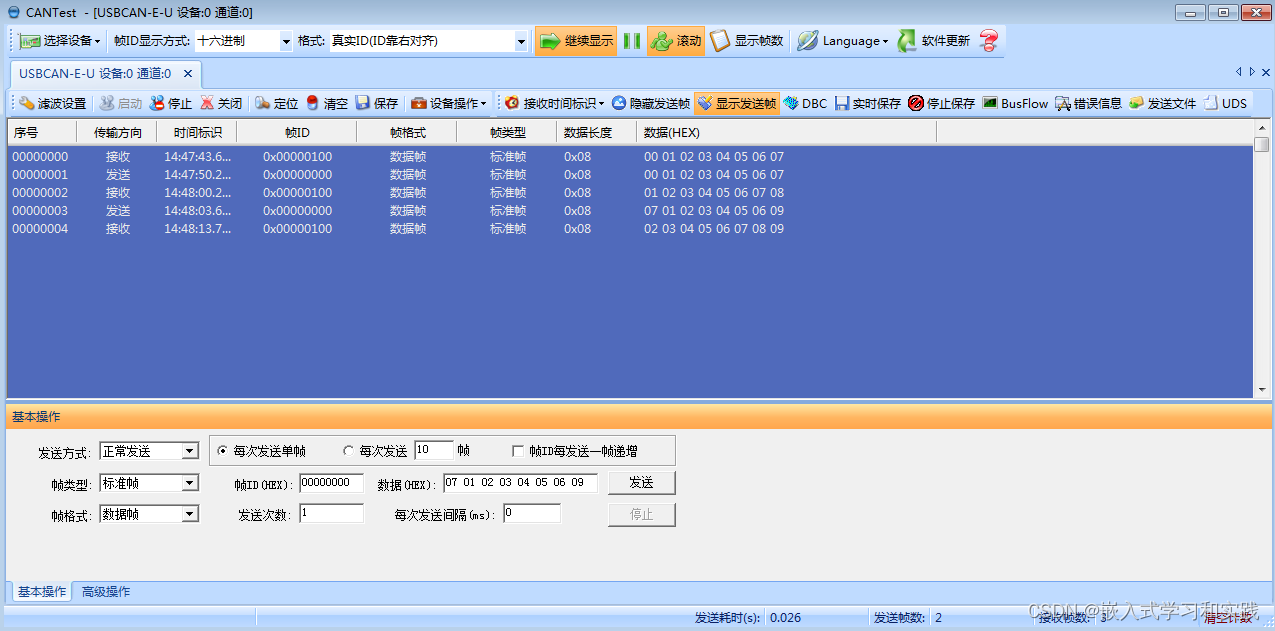
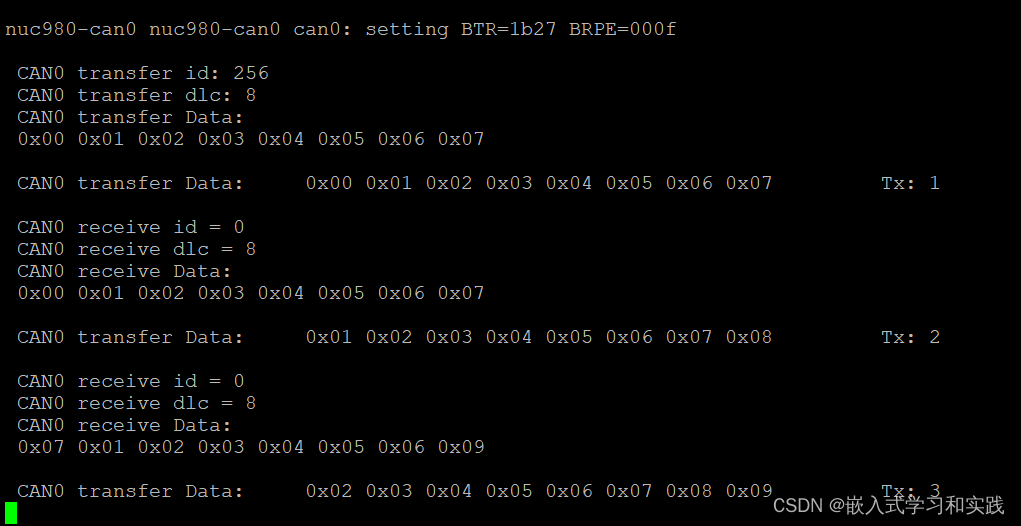
参考
https://blog.csdn.net/wallace89/article/details/111303439
这篇关于NUC980开发板CAN开发笔记的文章就介绍到这儿,希望我们推荐的文章对编程师们有所帮助!







